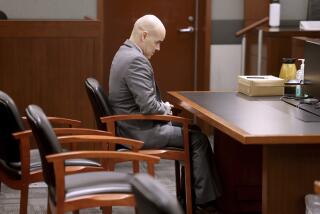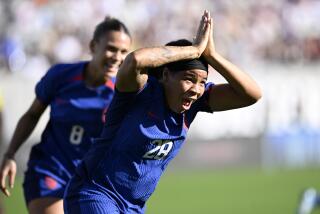U.S. OPEN NOTES : Seles Sure of Return by the Australian Open
NEW YORK — On a day when no big news took place at the U.S. Open, Monica Seles contributed to the shutout by holding a press conference.
Seles, who was stabbed in her shoulder during a match in Hamburg, Germany, April 30, had not met the press in any sort of open forum since that day. Recently, she did a session on ABC’s “Prime-Time Live,” and also an interview with the New York Times. But that was it until Monday, and sports media was sleepless from Seattle to St. Petersburg awaiting her words.
The result produced the following gems:
--She remains upset that the German man who stabbed her achieved his goal--to knock her out of the No. 1 world ranking so that Steffi Graf could have it.
--She misses the Grand Slam events so much that it currently is inconceivable to her that she won’t be playing by the Australian Open, in late January. “But that is too big a tournament to start right there,” she said. “I’d be too nervous. I’d have to play somewhere else first.”
--She can’t really foresee the future, but she is pretty sure she couldn’t be happy being No. 15 or 20. “Honestly, no. That’s not me,” she said. “I’d just have to work harder, but I’m sure life would go on.”
--She and her sports management representatives, IMG, have filed no suits in conjunction with the stabbing, although Seles did raise some questions about the security at the Hamburg event. “It was interesting that they changed their security after this happened,” she said. “If it had been OK, why did they change?”
Realistically, what else could she say? It’s old news that she was the victim of one of the stranger mid-event incidents in the history of sports, and that it has taken her away from her ability to earn a living and participate in the sport she loves.
But at the same time, she and her handlers, for some unknown reason, continue to allow mystery to surround her recovery. The last question of the press conference was a request for her to show what kind of range of motion she has in her left arm. Before she could even blink, her IMG rep, Bob Kain, said, “No.” And shortly, she was whisked away.
*
Steffi Graf won the elapsed-time derby over Martina Navratilova in their first-round wins. Graf knocked Robin White of San Diego out of the tournament in 42 minutes, 6-3, 6-0. Navratilova, laboring eight minutes longer, dispatched Gloria Pizzichini of Italy, 6-0, 6-1.
The biggest upset of the day, was Wayne Ferreira’s 7-6 (7-2), 4-6, 7-6 (9-7), 3-6, 6-2 victory over ninth-seeded Petr Korda of the Czech Republic. Alexander Volkov, seeded 14th, held off Jonathan Stark, 1-6, 6-3, 6-4, 6-7 (9-7), 6-3, and Paul Haarhuis of the Netherlands beat David Wheaton, 0-6, 7-6 (10-8), 6-4, 6-4.
*
This was the tournament in which they were going to rely on a system of non-human line-calling called TEL (Tennis Electronic Lines). But, at least for the moment, man will go forth where machines cannot.
The trouble with TEL is that, well, it didn’t work. One problem was that the chair umpire had to isolate specific areas of the court, such as the deuce box when the server was aiming there, etc. That got a bit too complicated.
Then, there was the matter of the dreaded K Swiss shoe, a brand which, when worn by one of the competitors would inexplicably trigger beeps resembling line calls. Something about the material in the shoe eyelets, it was said.
And the most frightening part? Much of the technology for TEL was similar to the process used by the U.S. military for its smart bombs in the Gulf War. Smart bombs are supposed to avoid civilians.
More to Read
Go beyond the scoreboard
Get the latest on L.A.'s teams in the daily Sports Report newsletter.
You may occasionally receive promotional content from the Los Angeles Times.











